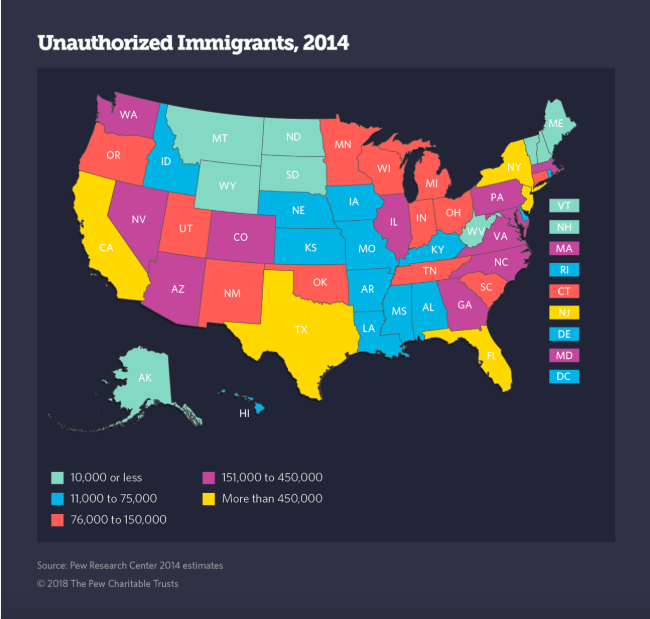Connecting state and local government leaders
Alabama sues to keep U.S. Census from counting undocumented immigrants. Phoenix City Council, meanwhile, votes to sue to block Census Bureau from asking whether someone is a citizen.
This article was originally published by Stateline, an initiative of The Pew Charitable Trusts, and was written by Tim Henderson.
As preparation for the 2020 census intensifies, states and cities are fighting over how — or whether — to accurately count the roughly 11 million immigrants living in the United States without authorization, a battle that will have a huge impact on federal aid and states’ political power for years to come.
The U.S. Census Bureau announced this year it plans to ask all households about citizenship status, a query not broached since 1950 and one that is now inflaming states’ angst over clout.
Many officials say the new census question will intimidate immigrants and stop them from answering any questions, resulting in an undercount that would make it harder for a city or state to provide services, said Greg Stanton, a Democrat who was mayor of Phoenix before resigning May 29 to run for Congress.
“I have to serve all the city’s people,” Stanton said in an interview with Stateline. “If we fail to get an accurate count, that’s going to hurt our city and our whole state. It should be a bipartisan issue.”
A state’s number of seats in the U.S. House of Representatives is based on its population — as are a variety of federal funding initiatives for cities and states alike — so a lot is at stake for governors and local officials in the way their residents are counted. With limited federal grant dollars and just 435 seats in Congress’ lower chamber, many officials believe they’re playing a zero-sum game for power and money.
Alabama recently filed suit against the U.S. Census Bureau to stop the census from counting such immigrants at all — an unlikely outcome considering the Supreme Court’s position in a 2016 decision. Alabama argues that if states such as California and Texas get to count immigrants who don’t have legal documentation, then Alabama, which has relatively few undocumented immigrants, surely will suffer. The state argues that it stands to lose a seat in Congress, along with an electoral vote. It could also lose federal funding.

Meanwhile the Phoenix City Council voted last week to sue the Census Bureau to block the citizenship question, as have several other cities and counties, and more than two dozen states with growing immigrant populations.
The Phoenix metro area has an estimated quarter-million residents who don’t have authorization to live in the United States, the 10th most among U.S. cities, according to 2014 estimates by the Pew Research Center (The Pew Charitable Trusts funds Stateline and the research center). Each uncounted person would cost the city more than $500 a year in lost state and federal funding, according to a city analysis.
Arizona Gov. Doug Ducey, a Republican, has declined to join the lawsuit, with a spokesman saying in April that the governor supports data-gathering.
Alabama’s lawsuit, filed this month, claims that a full count of immigrants would punish the state, giving it less political clout in Washington, D.C., and less federal funding than those states with more immigrants living in the United States illegally. (The Fourteenth Amendment apportions congressional seats by population, not citizenship.)
The state saw its immigrant population plummet after leaders enacted a law in 2011 making it a crime to live there without legal authorization or to hire, house or transport those residents. People fled to other states, and Alabama’s unauthorized population dropped nearly 20 percent, to 65,000, between 2009 and 2012, and had not rebounded by 2014, according to the research center estimates, after courts struck down many provisions of the law.
The 2020 census could, the lawsuit states, result in “roughly 20 Congressional seats taken from low-illegal alien population states and given to high-illegal alien states like California.” U.S. Rep. Mo Brooks, an Alabama Republican, also is a plaintiff.
U.S. Rep. Steve King, an Iowa Republican, introduced an unsuccessful bill last year calling for the census to ask about citizenship and legal status. But no state has followed Alabama in suing to stop the census from counting unauthorized immigrants altogether.
Steven Camarota, director of research for the Center for Immigration Studies, a Washington think tank that favors less immigration, said he sympathizes with Alabama but doesn’t think suing the U.S. Census Bureau is the answer.
“It is a problem,” Camarota said. “More congressional seats will go to places like Arizona and Texas and California. Is it right to count people who do not belong in this country and take representation away from American citizens? It’s tough.”
The ‘Three-Fifths Compromise’
The question of how the United States apportions states’ political power, and whether to include people who can’t vote, has been answered in different ways throughout its history.
Delegates to the 1787 U.S. Constitutional Convention determined that states could count their slaves as “three-fifths” of a free person — a compromise between the North, which didn’t want slaves counted at all, and the South, which wanted them fully counted to boost the region’s representation in the new House of Representatives.
The Fourteenth Amendment in 1868 struck down that compromise and inspired Congress to increase the House of Representatives’ size with the 1870 census to ensure balanced representation between Northern and Southern states.
More reapportionment laws followed in 1890, 1901 and 1911, as censuses were conducted and political interests jockeyed for power.
And immigration has played a role in reapportionment: In 1929, after millions of newcomers poured through Ellis Island, members of Congress — worried about rapid urbanization — required automatic reapportionment following every census. Yet another mathematical formula followed in 1941.
Phil Sparks, a co-director of the Census Project, a nonpartisan coalition that is pushing for more money for the 2020 count to improve its accuracy, said the citizenship question could be part of a Republican strategy to use citizens or voters alone as the basis for seats in Congress, which would erode Democratic power in Congress. The Census Project would be opposed to that, Sparks said.
“This is a two-step process,” Sparks said of what he calls a GOP strategy. “First you get the citizenship data, then you change the way seats are distributed so it’s based on voters or citizens alone.”
Counting voting-eligible population instead of all people in apportionment decisions would cut Democratic and Latino seats in Congress as well as in state legislatures, according to a 2015 study by former Harvard visiting scholar and political scientist Carl Klarner. It would also dilute power for African-Americans and poor people.
Kimball Brace, president of Election Data Services and a consultant who has worked on redistricting in 13 states, said the Alabama lawsuit is unlikely to change the nation’s system of using total population, rather than voting population, to apportion U.S. House seats.
The U.S. Supreme Court reaffirmed that approach in 2016 in Evenwel v. Abbott, upholding the right of states to use total population for redistricting.
“Representatives serve all residents, not just those eligible to vote,” read the majority opinion written by justice Ruth Bader Ginsburg. “Nonvoters have an important stake in many policy debates and in receiving constituent services.”
However, the decision did not rule out the possibility that individual states could use voters or citizens as a gauge, rather than total population, when drawing state district boundaries. Missouri’s Legislature is considering a Republican-sponsored bill requiring that only citizens be counted in state Legislature districts, if the census provides those numbers.
“I could see that happening, that Republican states might draw their own districts according to citizenship or eligible voters,” Brace said. “They couldn’t change the number of [congressional] seats they get, but within the states they could draw districts that way. The courts have allowed that.”

NEXT STORY: Trump’s Trade Tariffs May Cause 146,000 Job Losses in the U.S.



